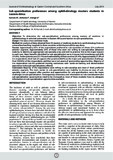| dc.contributor.author | Kariuki, M | |
| dc.contributor.author | Kithuka, P | |
| dc.contributor.author | Irungu, D | |
| dc.date.accessioned | 2015-02-27T13:43:11Z | |
| dc.date.available | 2015-02-27T13:43:11Z | |
| dc.date.issued | 2014-07 | |
| dc.identifier.citation | Kariuki, M., Kithuka, P., & Irungu, D. (2015). Sub-specialization preferences among ophthalmology masters students in Eastern Africa. JOECSA, 18(1). | en_US |
| dc.identifier.uri | http://hdl.handle.net/11295/80886 | |
| dc.description.abstract | Objective: To determine the sub-specialization preferences among masters of medicine in
ophthalmology in selected universities in Eastern Africa and barriers to sub-specialization.
Design: This was a cross-sectional study.
Method: An analysis of data obtained from 35 masters of medicine students in ophthalmology from six
universities/teaching hospitals in three countries within Eastern Africa was done.
Results: Approximately 69% of the respondents preferred to sub-specialize of whom 25% preferred
anterior segment. Approximately 25% of those who were not willing to sub-specialize advanced
inability to identify an appropriate sub-specialty area and wish to practice first as the major reasons
in each case. Major benefits identified for sub-specialization were; increase their knowledge and skills
(31.6%), better patient care (21.1%) and marketability of their services (26.4%). Approximately 27.8% of
the respondents cited lack of support after practice(38.9%) as the major sub-specialization challenge.
Over 33(94%) of the respondents said they were not aware of sponsorship opportunities. Majority of
the respondents (58.3%) preferred training institutions with hands-on-training and demonstrated
experience in the sub-specializations offered.
Conclusion: Majority of the respondents were willing to sub-specialize and most of them preferred
anterior segment. The main barrier to sub-specialization was inability to choose an area of subspecialty.
Lack of support after practice and opportunities for sub-specialization, were the major
challenges to sub-specialization. Consequently, awareness and information on sub-specialization and
sub-specialization opportunities need to be increased as most of these students have no adequate
information on sub-specialization opportunities available. | en_US |
| dc.language.iso | en | en_US |
| dc.publisher | University of Nairobi | en_US |
| dc.title | Sub-specialization preferences among ophthalmology masters students in Eastern Africa | en_US |
| dc.type | Article | en_US |
| dc.type.material | en_US | en_US |

